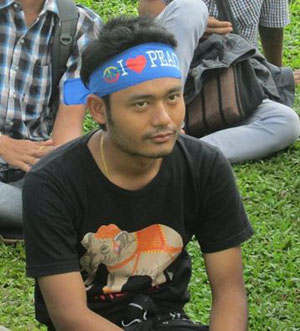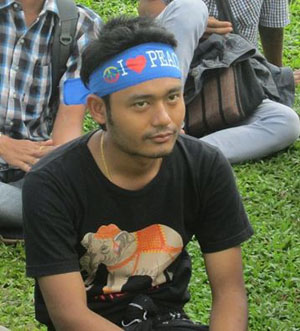RANGOON — A young poet in the former capital has become the third known Burmese citizen to be sued over a controversial Facebook post, after sharing a graphic rhyme suggesting he had a tattoo of the president on his penis.
Maung Saungkha, a writer and activist who lives in Rangoon’s Shwepyithar Township, told The Irrawaddy by phone on Wednesday that he has been in hiding since Oct. 8, the day he shared a poem titled “Image,” part of which reads:
I have the president’s portrait tattooed on my penis / How disgusted my wife is
The 23-year-old director of the Poetry Lover Organization, which aims to promote peace through lyrical literature, said he was shortly after informed that the post had come to the attention of President’s Office Director Zaw Htay, also known as Hmuu Zaw.
Sharing the content to his own Facebook page, the official commented atop the post that Maung Saungkha “should be prepared to take responsibility for what he did.”
That very evening, the fugitive said, police arrived at his home in Rangoon’s northern district.
“Luckily, I wasn’t there at the time,” he said, explaining that he had not returned since, nearly two full weeks later.
The Irrawaddy contacted Zaw Htay on Oct. 8, before the case had been filed, who said at the time that authorities “will proceed according to the law.”

Police in Shwepyithar confirmed that a case was filed against Maung Saungkha by Police Chief Thein Win under Article 66(d) of the Telecommunications Law, the same provision levied last week against Kachin aid worker Patrick Khum Jaa Lee—who is also the husband of esteemed peace activist May Sabe Phyu.
The controversial law was wielded again on Saturday against an official for the ruling Union Solidarity and Development Party (USDP), after he allegedly shared a digitally altered photo on Facebook transposing the face of opposition leader Aung San Suu Kyi onto the body of a naked woman.
Both cases followed the arrest early last week of a young woman who shared a satirical photo collage, also on Facebook, likening the Burma Army’s new uniforms to Suu Kyi’s htamein, or female traditional longyi.
Chaw Sandi Tun faces up to five years in prison for a charge under the Electronic Transactions Law, while the Telecommunications Law carries penalties of up to three years. All three cases are charges of criminal defamation.
Maung Saungkha said he had no intent to defame Burma’s President, Thein Sein, claiming the verse was meant to be ambiguously about oppressive authority and not directed at any one individual.
“It could be about Saddam Hussein, or Assad,” the bard implored. “Why do they think it’s U Thein Sein? There is not a single mention of Myanmar in my poem.”
“The government doesn’t understand poetry. They are afraid of poets as poetry carries public voices.”
Inspired by images shared widely on social media of political party loyalists boasting tattoos of Suu Kyi and her father, the late Gen. Aung San, on their chests, Maung Saungkha said the pictures set his mind in motion.
“If people have tattoos of those they love on their chests, I wondered where they might put a tattoo of someone they hate,” he said. “Then I wrote that poem.”
Maung Saungkha is known among a strain of Rangoon’s creative youth as a talented emerging writer who has been published in several print and online magazines. He was also active in a “white arm band” campaign earlier this year, a grassroots movement protesting a violent police crackdown on peaceful student protesters in Letpadan, Pegu Division, on March 10.
The young writer and activist suspects his participation in the campaign may have put him on the radar of local authorities, posing that, “I think I have been on their list since then.”

















